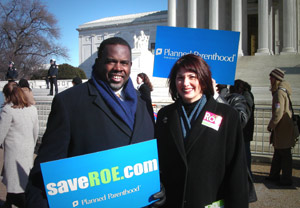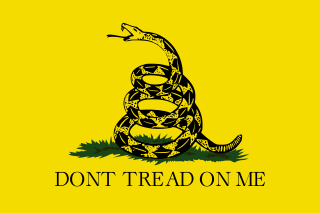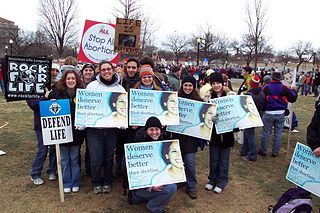
A political movement is a collective attempt by a group of people to change government policy or social values. Political movements are usually in opposition to an element of the status quo, and are often associated with a certain ideology. Some theories of political movements are the political opportunity theory, which states that political movements stem from mere circumstances, and the resource mobilization theory which states that political movements result from strategic organization and relevant resources. Political movements are also related to political parties in the sense that they both aim to make an impact on the government and that several political parties have emerged from initial political movements. While political parties are engaged with a multitude of issues, political movements tend to focus on only one major issue.

The United States abortion-rights movement is a sociopolitical movement in the United States supporting the view that a woman should have the legal right to an elective abortion, meaning the right to terminate her pregnancy, and is part of a broader global abortion-rights movement. The movement consists of a variety of organizations, with no single centralized decision-making body.

Libertarians promote individual liberty and seek to minimize the role of the state. The abortion debate is mainly within right-libertarianism between cultural liberals and social conservatives as left-libertarians generally see it as a settled issue regarding individual rights, as they support legal access to abortion as part of what they consider to be a woman's right to control her body and its functions. Religious right and intellectual conservatives have attacked such libertarians for supporting abortion rights, especially after the demise of the Soviet Union led to a greater divide in the conservative movement between libertarians and social conservatives. Libertarian conservatives claim libertarian principles such as the non-aggression principle (NAP) apply to human beings from conception and that the universal right to life applies to fetuses in the womb. Thus, some of those individuals express opposition to legal abortion. According to a 2013 survey, 5.7/10 of American Libertarians oppose making it more difficult for a woman to get an abortion.

A social movement is a loosely organized effort by a large group of people to achieve a particular goal, typically a social or political one. This may be to carry out a social change, or to resist or undo one. It is a type of group action and may involve individuals, organizations, or both. Social movements have been described as "organizational structures and strategies that may empower oppressed populations to mount effective challenges and resist the more powerful and advantaged elites". They represent a method of social change from the bottom within nations. On the other hand, some social movements do not aim to make society more egalitarian, but to maintain or amplify existing power relationships. For example, scholars have described fascism as a social movement.
The abortion debate is a longstanding, ongoing controversy that touches on the moral, legal, medical, and religious aspects of induced abortion. In English-speaking countries, the debate most visibly polarizes around adherents of the self-described "pro-choice" and "pro-life" movements. Pro-choice supporters uphold that individuals have the right to make their own decisions about their reproductive health, and that they should have the option to end a pregnancy if they choose to do so, taking into account various factors such as the stage of fetal development, the health of the woman, and the circumstances of the conception. Pro-life advocates, on the other hand, maintain that a fetus is a human being with inherent rights that cannot be overridden by the woman's choice or circumstances, and that abortion is morally wrong in most or all cases. Both terms are considered loaded words in mainstream media, where terms such as "abortion rights" or "anti-abortion" are generally preferred.
REAL Women of Canada is a socially conservative advocacy group in Canada. The organization was founded in 1983.
The consistent life ethic (CLE), also known as the consistent ethic of life or whole life ethic, is an ideology that opposes abortion, capital punishment, assisted suicide, and euthanasia. Adherents oppose war, or at the very least unjust war; some adherents go as far as full pacifism and so oppose all war. Many authors have understood the ethic to be relevant to a broad variety of areas of public policy as well as social justice issues. The term was popularized in 1983 by the Catholic prelate Joseph Bernardin in the United States to express an ideology based on the premise that all human life is sacred and should be protected by law. While there are many adherents, CLE is not exclusively but primarily a Catholic doctrine and/or associated with the Catholic Church.
Pro-life feminism is the opposition to abortion by some feminists. Pro-life feminists may believe that the principles behind women's rights also call them to oppose abortion on right to life grounds and that abortion hurts women more than it benefits them.

The United Statesanti-abortion movement is a movement in the United States that opposes induced abortion and advocates for the protection of fetal life. Advocates support legal prohibition or restriction on ethical, moral, or religious grounds, arguing that human life begins at conception and that the human zygote, embryo or fetus is a person and therefore has a right to life. The anti-abortion movement includes a variety of organizations, with no single centralized decision-making body. There are diverse arguments and rationales for the anti-abortion stance. Some allow for some permissible abortions, including therapeutic abortions, in exceptional circumstances such as incest, rape, severe fetal defects, or when the woman's health is at risk.
Antifeminism, also spelled anti-feminism, is opposition to feminism. In the late 19th century and early 20th century, antifeminists opposed particular policy proposals for women's rights, such as the right to vote, educational opportunities, property rights, and access to birth control. In the mid and late 20th century, antifeminists often opposed the abortion-rights movement.

Anti-suffragism was a political movement composed of both men and women that began in the late 19th century in order to campaign against women's suffrage in countries such as Australia, Canada, Ireland, the United Kingdom and the United States. To some extent, Anti-suffragism was a Classical Conservative movement that sought to keep the status quo for women. More American women organized against their own right to vote than in favor of it, until 1916. Anti-suffragism was associated with "domestic feminism," the belief that women had the right to complete freedom within the home. In the United States, these activists were often referred to as "remonstrants" or "antis."

The Silent Scream is a 1984 anti-abortion film created and narrated by Bernard Nathanson, a former abortion provider who had become an anti-abortion activist. It was produced by Crusade for Life, Inc., an evangelical anti-abortion organization, and has been described as a pro-life propaganda film. The film depicts the abortion process via ultrasound and shows an abortion taking place in the uterus. During the abortion process, the fetus is described as appearing to make outcries of pain and discomfort. The video has been a popular tool used by the anti-abortion campaign in arguing against abortion, but it has been criticized as misleading by members of the medical community.
The genetics and abortion issue is an extension of the abortion debate and the disability rights movement. Since the advent of forms of prenatal diagnosis, such as amniocentesis and ultrasound, it has become possible to detect the presence of congenital disorders in the fetus before birth. Specifically, disability-selective abortion is the abortion of fetuses that are found to have non-fatal mental or physical defects detected through prenatal testing. Many prenatal tests are now considered routine, such as testing for Down syndrome. Women who are discovered to be carrying fetuses with disabilities are often faced with the decision of whether to abort or to prepare to parent a child with disabilities.
The Rainbow Pro-Life Alliance, formerly known as the Pro-Life Alliance of Gays and Lesbians (PLAGAL), is a United States-based interest group opposed to legalized elective abortion and supportive of alternatives to abortion.
Abortion in Turkey has been legal on request since May 27, 1983. Abortion is legal up to 10 weeks of pregnancy, and in special circumstances the time threshold can be extended if there is danger to the woman's life or the life of the fetus. During the ten weeks, an abortion is allowed for the following reasons: the pregnancy threatens the woman's mental and/or physical health, the fetus would be physically or mentally impaired, if the conception occurred through rape or incest, and economic or social reasons. The woman's consent is required. If the woman is under the age of 18, then parental consent is required. If the woman is married, the consent of the husband is also required. Single women over the age of 18 can choose to have an abortion on their own.
In sociology, moral shock is a cognitive and emotional process that encourages participation. James M. Jasper, who originally coined the term, used it to help explain why people might join a social movement in the absence of pre-existing social ties with members. It denotes a kind of visceral unease, triggered by personal or public events, that captures people’s attention. Moral shocks often force people to articulate their moral intuitions. It is an appealing concept because it brings together emotional, moral, and cognitive dynamics. According to David A. Snow and Sarah A. Soule, authors of “A Primer on Social Movements”, the moral shock argument says that some events may be so emotionally moving or morally reprehensible that individuals will feel that they must join the cause regardless of their connection or ties to members of that organization. Moral shock is similar in many ways to shock advertising which uses analogous techniques to help increase brand success and awareness. Moral shocks have been shown to help recruit people to the animal rights movement, the movement for peace in Central America, anti-abortion campaigns and anti-racist movements.

Abortion-rights movements, also self-styled as pro-choice movements, advocate for the right to have legal access to induced abortion services including elective abortion. They seek to represent and support women who wish to terminate their pregnancy without fear of legal or social backlash. These movements are in direct opposition to anti-abortion movements.

Anti-abortion movements, also self-styled as pro-life movements, are involved in the abortion debate advocating against the practice of abortion and its legality. Many anti-abortion movements began as countermovements in response to the legalization of elective abortions.

The anti-gender movement is an international movement that opposes what it refers to as "gender ideology", "gender theory", or "genderism", terms which cover a variety of issues, and do not have a coherent definition. Members of the anti-gender movement are largely on the right-wing and far-right political spectrum, such as right-wing populists, social conservatives, and Christian fundamentalists. It has been linked to a shift away from liberal democracy and towards right-wing populism. Anti-gender rhetoric has seen increasing circulation in trans-exclusionary radical feminist (TERF) discourse since 2016. Different members of the anti-gender movement variously oppose some LGBT rights, some reproductive rights, government gender policies, gender equality, gender mainstreaming, and gender studies academic departments. The Canadian Security Intelligence Service has linked the anti-gender movement to the risk of "extreme violence" against the LGBTQI+ community. UN Women has described the anti-gender, gender-critical and men’s rights movements as extreme anti-rights movements that "use hateful propaganda and disinformation to target and attempt to delegitimize people with diverse sexual orientations, gender identities, gender expressions, and sex characteristics."









